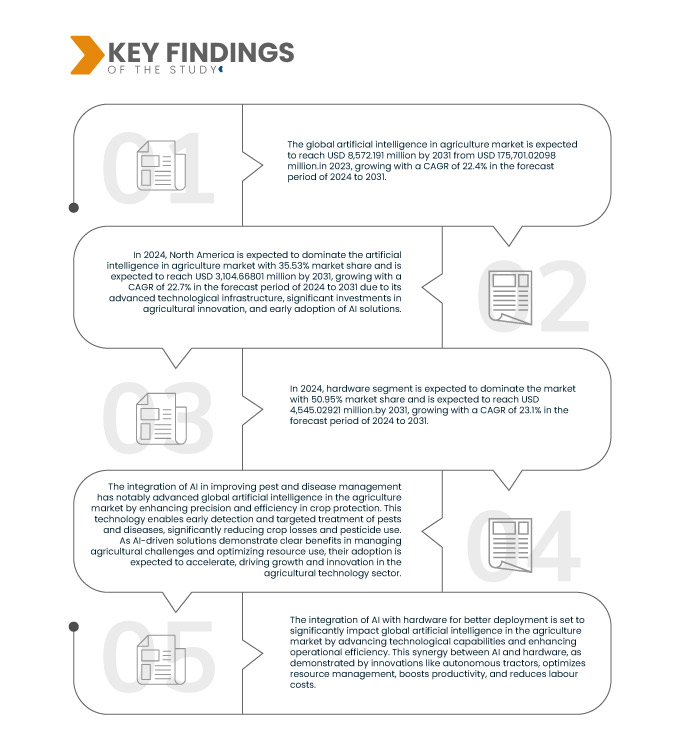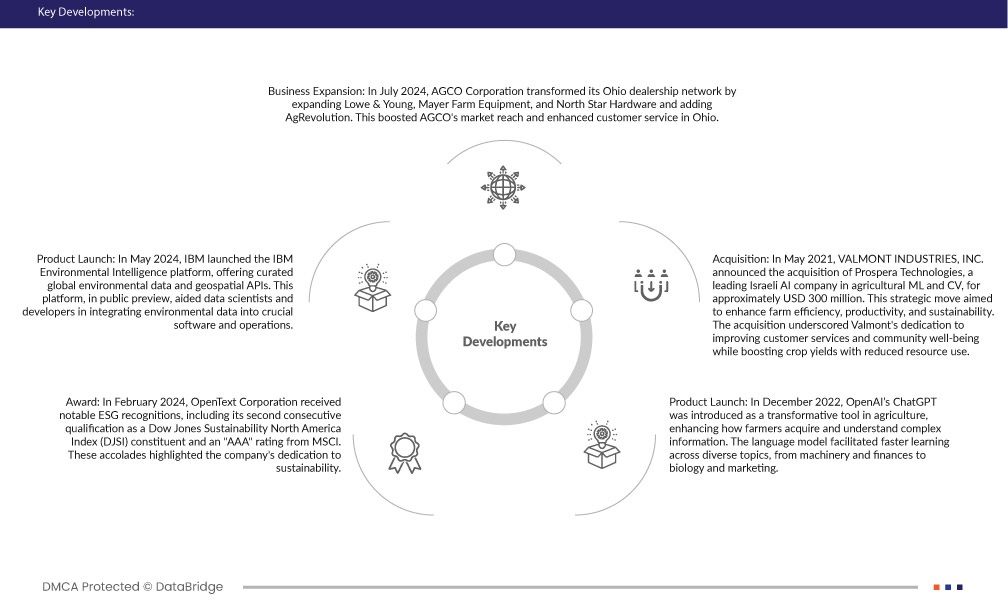تُحدث التطورات في مراقبة المحاصيل ودقة التنبؤ بالغلة باستخدام الذكاء الاصطناعي تأثيرًا كبيرًا على الذكاء الاصطناعي العالمي في سوق الزراعة. تُحسّن تقنيات الذكاء الاصطناعي جمع البيانات وتحليلها وقدرات التنبؤ، مما يُؤدي إلى ممارسات زراعية أكثر دقة وكفاءة. يُسهم هذا التوجه في نمو السوق مع تزايد اعتماد المزارعين والشركات الزراعية على حلول الذكاء الاصطناعي لتلبية الطلب المتزايد على الغذاء ومواجهة التحديات البيئية. يُبرز تحسين دقة التنبؤ بالغلة وإدارة المحاصيل الدور المحوري للذكاء الاصطناعي في إحداث نقلة نوعية في الممارسات الزراعية العالمية.
يمكنك الوصول إلى التقرير الكامل على https://www.databridgemarketresearch.com/reports/global-ai-agriculture-market
تحلل شركة Data Bridge Market Research أن سوق الذكاء الاصطناعي العالمي في الزراعة من المتوقع أن يصل إلى 8.57 مليار دولار أمريكي بحلول عام 2031 من 1.75 مليار دولار أمريكي في عام 2023، بنمو بمعدل نمو سنوي مركب قدره 22.4٪ في الفترة المتوقعة من 2024 إلى 2031.
النتائج الرئيسية للدراسة
زيادة تطبيق تقنيات الزراعة الأفضل باستخدام الذكاء الاصطناعي
يُعدّ التغيير الثقافي من أصعب مراحل تحقيق مرونة الأعمال، إذ يتطلب التزامًا من القيادة العليا. وقد ازدادت المنافسة بشكل كبير، وظهرت أساليب راسخة مثل سكرم وSAFe قد لا تكون كافية. ونتيجةً لذلك، تتجه الشركات اليوم إلى الاستعانة بخدمات التعهيد الخارجي (BPO) لزيادة الكفاءة والموثوقية مع تقليل المخاطر. ولذلك، فإن المشهد المؤسسي المضطرب بسبب الشركات الجديدة والمنافسة الشرسة، يجعل مرونة الأعمال عاملًا أساسيًا في نمو السوق.
نطاق التقرير وتقسيم السوق
مقياس التقرير
|
تفاصيل
|
فترة التنبؤ
|
من 2024 إلى 2031
|
سنة الأساس
|
2023
|
سنة تاريخية
|
2021 (قابلة للتخصيص حتى 2016-2021)
|
الوحدات الكمية
|
الإيرادات بالمليار
|
القطاعات المغطاة
|
من خلال العرض (الأجهزة والبرامج والخدمات)، والتكنولوجيا [التعلم الآلي (ML)، والرؤية الحاسوبية، ومعالجة اللغة الطبيعية (NLP) ، والروبوتات والأتمتة)، والتطبيق ( الزراعة الدقيقة ، ومراقبة الثروة الحيوانية ، والتنبؤ بالطقس، وإدارة التربة، ومراقبة صحة المحاصيل، وتحسين سلسلة التوريد)، ووضع النشر (السحابي، وفي الموقع)، والمستخدم النهائي (المزارع، وشركات التكنولوجيا الزراعية، وشركات الكيماويات الزراعية، ومعاهد البحث)
|
الدول المغطاة
|
الولايات المتحدة الأمريكية، كندا، إيطاليا، فرنسا، ألمانيا، إسبانيا، بولندا، هولندا، رومانيا، الدنمارك، بلجيكا، اليونان، المجر، البرتغال، أيرلندا، النمسا، التشيك، السويد، بلغاريا، فنلندا، كرواتيا، ليتوانيا، سلوفاكيا، لاتفيا، سلوفينيا، قبرص، إستونيا، لوكسمبورغ، مالطا، وأوروبا غير الأعضاء في الاتحاد الأوروبي. الصين، أستراليا، اليابان، كوريا الجنوبية، الهند، نيوزيلندا، تايوان، سنغافورة، ماليزيا، تايلاند، فيتنام، إندونيسيا، الفلبين، وبقية دول آسيا والمحيط الهادئ. البرازيل، الأرجنتين، المكسيك، وبقية دول أمريكا اللاتينية. المملكة العربية السعودية، جنوب أفريقيا، مصر، البحرين، عُمان، إسرائيل، الكويت، قطر، الإمارات العربية المتحدة، وبقية دول الشرق الأوسط وأفريقيا.
|
الجهات الفاعلة في السوق المغطاة
|
شركة Open Text Corporation (كندا)، شركة VALMONT INDUSTRIES (الولايات المتحدة)، شركة OpenAI (الولايات المتحدة)، شركة Agco Corporation (الولايات المتحدة)، شركة IBM (الولايات المتحدة)، شركة ADM (الولايات المتحدة)، شركة Ageagle Aerial systems Inc (الولايات المتحدة)، شركة Alphabet Inc (الولايات المتحدة)، شركة Bayer AG (ألمانيا)، شركة Bowery Farming Inc (الولايات المتحدة)، شركة Cisco Systems (الولايات المتحدة)، شركة Climate Ai (الولايات المتحدة)، شركة CNh industrial NV (المملكة المتحدة)، شركة Corteva (الولايات المتحدة)، شركة Deere & Company (الولايات المتحدة)، شركة DeLaval (السويد)، شركة Gamaya (سويسرا)، شركة Harvest CROO Robotics LLC (الولايات المتحدة)، شركة Kubota Corporation (اليابان)، شركة Lely (هولندا)، شركة Microsoft (الولايات المتحدة)، شركة Oracle (الولايات المتحدة)، شركة Raven Industries, Inc. (شركة تابعة لشركة CNH) (الولايات المتحدة)، مجموعة Syngenta AG (سويسرا)، وشركة YANMAR HOLDING CO., LTD. (اليابان).
|
نقاط البيانات التي يغطيها التقرير
|
بالإضافة إلى رؤى السوق مثل القيمة السوقية ومعدل النمو وشرائح السوق والتغطية الجغرافية والجهات الفاعلة في السوق وسيناريو السوق، فإن تقرير السوق الذي أعده فريق أبحاث سوق Data Bridge يتضمن تحليلًا متعمقًا من الخبراء وتحليل الاستيراد / التصدير وتحليل التسعير وتحليل استهلاك الإنتاج وتحليل المدقة.
|
تحليل القطاعات
يتم تقسيم سوق الذكاء الاصطناعي في الزراعة إلى خمسة قطاعات بارزة، والتي تعتمد على أساس العرض والتكنولوجيا والتطبيق وطريقة النشر والمستخدم النهائي.
- على أساس العرض، يتم تقسيم السوق إلى أجهزة وبرامج وخدمات
في عام 2024، من المتوقع أن يهيمن قطاع الأجهزة على سوق الذكاء الاصطناعي في الزراعة
من المتوقع أن تهيمن شريحة الأجهزة على السوق في عام 2024 بحصة سوقية تبلغ 50.95% بسبب دورها الأساسي في دمج أجهزة الاستشعار والطائرات بدون طيار والآلات المستقلة للزراعة الدقيقة .
- على أساس التكنولوجيا، يتم تقسيم السوق إلى التعلم الآلي (ML)، والرؤية الحاسوبية، ومعالجة اللغة الطبيعية (NLP)، والروبوتات والأتمتة وغيرها
في عام 2024، من المتوقع أن يهيمن قطاع التعلم الآلي (ML) على سوق الذكاء الاصطناعي في الزراعة
من المتوقع أن تهيمن تقنية التعلم الآلي (ML) على السوق في عام 2024 بحصة سوقية تبلغ 37.84% بسبب قدرتها على تحليل كميات هائلة من البيانات الزراعية لتحسين عملية اتخاذ القرار والتحليلات التنبؤية.
- بناءً على التطبيق، يُقسّم السوق إلى الزراعة الدقيقة، ومراقبة الثروة الحيوانية، والتنبؤ بالطقس، وإدارة التربة، ومراقبة صحة المحاصيل، وتحسين سلسلة التوريد، وغيرها. في عام 2024، من المتوقع أن يهيمن قطاع الزراعة الدقيقة على السوق بحصة سوقية تبلغ 33.26%.
- بناءً على طريقة النشر، يُقسّم السوق إلى سحابي ومحلي. في عام ٢٠٢٤، من المتوقع أن يهيمن قطاع السحابة على السوق بحصة سوقية تبلغ ٦٢.٦١٪.
- بناءً على المستخدم النهائي، يُقسّم السوق إلى مزارع، وشركات تكنولوجيا زراعية، وشركات كيماويات زراعية، ومعاهد بحثية، وغيرها. في عام ٢٠٢٤، من المتوقع أن يهيمن قطاع المزارع على السوق بحصة سوقية تبلغ ٣٩.٩١٪.
اللاعبون الرئيسيون
قامت شركة Data Bridge Market Research بتحليل شركة Open Text Corporation (كندا)، وشركة VALMONT INDUSTRIES, INC. (الولايات المتحدة)، وشركة OpenAI (الولايات المتحدة)، وشركة Agco Corporation (الولايات المتحدة)، وشركة IBM (الولايات المتحدة)، باعتبارها اللاعبين الرئيسيين في سوق الذكاء الاصطناعي العالمي في الزراعة.
التطورات الأخيرة
- في يوليو 2024، طوّرت شركة AGCO شبكة وكلائها في أوهايو بتوسيع نطاق وكلاء Lowe & Young، وMayer Farm Equipment، وNorth Star Hardware، وإضافة AgRevolution. وقد ساهم ذلك في تعزيز حضور AGCO في السوق وتحسين خدمة العملاء في أوهايو.
- في مايو 2024، أطلقت IBM منصة IBM للاستخبارات البيئية، التي توفر بيانات بيئية عالمية مُختارة بعناية وواجهات برمجة تطبيقات جغرافية مكانية. تُساعد هذه المنصة، التي لا تزال في مرحلة المعاينة العامة، علماء البيانات والمطورين على دمج البيانات البيئية في البرامج والعمليات الحيوية. ومن خلال الاستفادة من التقنيات المتقدمة، ساعدت IBM العملاء على التخفيف من الآثار المالية للاضطرابات المناخية. كما عزز هذا الابتكار مكانة IBM في السوق من خلال تعزيز مرونة العملاء وتعزيز ممارسات الأعمال المستدامة.
- في فبراير 2024، حصلت شركة OpenText Corporation على تقديرات مرموقة في مجال الحوكمة البيئية والاجتماعية وحوكمة الشركات، بما في ذلك تصنيفها للمرة الثانية على التوالي كأحد مكونات مؤشر داو جونز للاستدامة في أمريكا الشمالية (DJSI)، وتصنيف "AAA" من MSCI. وقد أبرزت هذه التقديرات التزام الشركة بالاستدامة. وقد عززت هذه التقديرات سمعة OpenText في هذا القطاع، وجذبت المزيد من العملاء والمستثمرين الذين يولون المسؤولية البيئية الأولوية، مما عزز مكانتها في السوق ودفع عجلة نموها.
- في ديسمبر 2022، طُرح برنامج ChatGPT من OpenAI كأداة ثورية في مجال الزراعة، مُحسّنًا بذلك كيفية اكتساب المزارعين للمعلومات المعقدة وفهمها. سهّل نموذج اللغة التعلم السريع في مختلف المواضيع، من الآلات والمالية إلى علم الأحياء والتسويق. أثبتت هذه التقنية المتقدمة أهميتها البالغة للمزارعين الذين يحتاجون إلى معرفة سريعة وفعالة. أدى اعتماد ChatGPT إلى تحسين الكفاءة التشغيلية واتخاذ قرارات مدروسة في الممارسات الزراعية. ومن خلال الاستفادة من هذه التطورات في الذكاء الاصطناعي، رسّخت OpenAI مكانتها كمبتكر رئيسي في مجال التكنولوجيا الزراعية، مما ساهم في نمو كبير وتأثير كبير في هذا المجال.
- في مايو 2021، أعلنت شركة فالمونت للصناعات عن استحواذها على شركة بروسبيرا تكنولوجيز، وهي شركة إسرائيلية رائدة في مجال الذكاء الاصطناعي في مجال التعلم الآلي والتعلم الآلي الزراعي، مقابل حوالي 300 مليون دولار أمريكي. هدفت هذه الخطوة الاستراتيجية إلى تعزيز كفاءة المزارع وإنتاجيتها واستدامتها. وأكد هذا الاستحواذ التزام فالمونت بتحسين خدمات العملاء ورفاهية المجتمع، مع زيادة إنتاجية المحاصيل مع ترشيد استخدام الموارد. عزز هذا الاستحواذ مكانة فالمونت في السوق بشكل كبير، وعزز التزامها بالحلول الزراعية المبتكرة، مما أفاد الشركة في نهاية المطاف من خلال تحسين عروض خدماتها وكفاءتها التشغيلية.
التحليل الإقليمي
بناءً على التوزيع الجغرافي، يُقسّم السوق إلى الولايات المتحدة الأمريكية، وكندا، وإيطاليا، وفرنسا، وألمانيا، وإسبانيا، وبولندا، وهولندا، ورومانيا، والدنمارك، وبلجيكا، واليونان، والمجر، والبرتغال، وأيرلندا، والنمسا، والتشيك، والسويد، وبلغاريا، وفنلندا، وكرواتيا، وليتوانيا، وسلوفاكيا، ولاتفيا، وسلوفينيا، وقبرص، وإستونيا، ولوكسمبورغ، ومالطا، وأوروبا غير الأعضاء في الاتحاد الأوروبي. كما يشمل السوق الصين، وأستراليا، واليابان، وكوريا الجنوبية، والهند، ونيوزيلندا، وتايوان، وسنغافورة، وماليزيا، وتايلاند، وفيتنام، وإندونيسيا، والفلبين، وبقية دول آسيا والمحيط الهادئ. والبرازيل، والأرجنتين، والمكسيك، وبقية دول أمريكا اللاتينية. وتشمل السوق المملكة العربية السعودية، وجنوب أفريقيا، ومصر، والبحرين، وعُمان، وإسرائيل، والكويت، وقطر، والإمارات العربية المتحدة، وبقية دول الشرق الأوسط وأفريقيا.
وفقًا لتحليل أبحاث سوق Data Bridge :
تسيطر أمريكا الشمالية على السوق العالمية.
من المتوقع أن تهيمن أمريكا الشمالية على سوق الذكاء الاصطناعي في الزراعة بسبب بنيتها التحتية التكنولوجية المتقدمة واستثماراتها الكبيرة في الابتكار الزراعي والتبني المبكر لحلول الذكاء الاصطناعي.
من المتوقع أن تكون أوروبا أسرع المناطق نموًا في سوق الذكاء الاصطناعي الزراعي، بفضل استثماراتها القوية في تقنيات الزراعة الذكية والدعم الحكومي القوي للابتكار الزراعي. إضافةً إلى ذلك، يُسهم تركيز المنطقة على ممارسات الزراعة المستدامة والاعتماد المتزايد على الزراعة الدقيقة في دفع هذا النمو السريع.
لمزيد من المعلومات التفصيلية حول تقرير سوق الذكاء الاصطناعي العالمي في الزراعة، انقر هنا - https://www.databridgemarketresearch.com/reports/global-ai-agriculture-market












